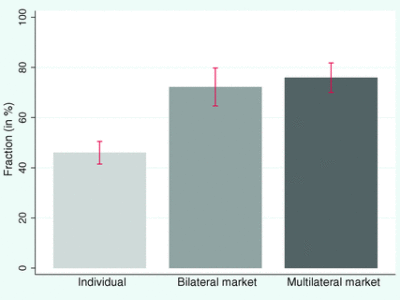regulatory policy
Why Pollution Regulations Aren’t Taxes
Opponents of environmental regulations love to call them hidden taxes. But constant repetition doesn’t make this idea true.
If you’ve seen a statement that regulations are hidden taxes, that’s not too surprising. Googling “regulation hidden taxes” produces over three million hits. But in fact, pollution regulations and taxes are completely different. The reason is simple. A tax removes value from the private sector. Environmental regulations simultaneously remove value from one part of …
Continue reading “Why Pollution Regulations Aren’t Taxes”
CONTINUE READINGOn our reading list: Market framing and morality
Economists offer experimental evidence that market transactions blunt moral intuitions
Take my views on this study with a grain salt, because it confirms my priors. I’ve long agreed intuitively with Mark Sagoff that people make different choices in market settings than in more public-regarding settings. And I’ve been fascinated over the years by the empirical evidence that confirms that intuition, including the work of Samuel …
Continue reading “On our reading list: Market framing and morality”
CONTINUE READINGKing Coal’s Fading Grip
According to a new study from Duke, coal may be on the way out. as “[l]ow natural gas prices and stricter, federal emission regulations are promoting a shift away from coal power plants and toward natural gas plants as the lowest-cost means of generating electricity in the United States.” The authors estimate that “the economic …
Continue reading “King Coal’s Fading Grip”
CONTINUE READINGWho’s Afraid of Environmental Regulations? (Not Small Businesses)
There has been a lot of chatter about the burden of regulations on small businesses. It turns out that small business owners do worry about regulations a lot — but not so much environmental regulations. According to a new survey, what they really care about are licensing and tax regulations. Environmental regulations just don’t matter much.
CONTINUE READINGOMB’s Dubious Claim to Regulatory Expertise
The head of OIRA – the Office of Information and Regulatory Affairs at OMB– is often called the White House’s regulation czar. OIRA is charged with reviewing the cost-benefit analysis of all major government regulations. This task is all about economics. Yet OIRA has never established the kind of reputation for economics expertise held by …
Continue reading “OMB’s Dubious Claim to Regulatory Expertise”
CONTINUE READINGGreat Expectations: A Dozen Views of Obama’s Second Term
As we approach inauguration day next month, I thought it would be interesting to pull together the advice that people are giving him about his second term. Here are some links if you’re interested in what people are hoping for (or in some cases, dreading). From the N.Y. Times, the views of Carol Browner (advocating …
Continue reading “Great Expectations: A Dozen Views of Obama’s Second Term”
CONTINUE READINGThe Overly Facile Comparison Between Regulations and Taxes
Romney’s argument for a regulatory cap equates regulations with taxes. My initial reaction was that this was an absurd comparison – taxes are payments to the government, whereas regulations reduce externalities. But after further thought, I decided that my initial reaction was a little too facile. Regulatory costs do have some of the same economic …
Continue reading “The Overly Facile Comparison Between Regulations and Taxes”
CONTINUE READINGThe Mythical Threat of a Regulatory Deluge
Conservatives are now spreading the myth that, if the country fails to elect Mitt Romney, the aftermath will be a deluge of federal regulations. Republican state attorney generals are hitting the campaign trail to this fear of a coming regulatory flood in a post-Romney world. (here). This myth has been debunked by Cass Sunstein, who …
Continue reading “The Mythical Threat of a Regulatory Deluge”
CONTINUE READINGThe Romney Website’s Circular Blame Game
The Romney website portrays regulation as a huge drag on the economy. But it can’t decide who’s to blame. Is it all Obama’s fault? Or not just Obama, but a whole succession of Presidents, many of them presumably Republicans? Or is it bureaucrats who have overpowered all of these Presidents? The website goes around in …
Continue reading “The Romney Website’s Circular Blame Game”
CONTINUE READINGWhy We Need Administrative Agencies like EPA
Bureaucrats aren’t very popular. But consider the alternatives when it comes to dealing with environmental problems. Basically, bureaucrats are part of the executive branch of government. For instance, the head of EPA is appointed by the President and can be removed by the President at any time. (A few agencies such as the SEC enjoy …
Continue reading “Why We Need Administrative Agencies like EPA”
CONTINUE READING





